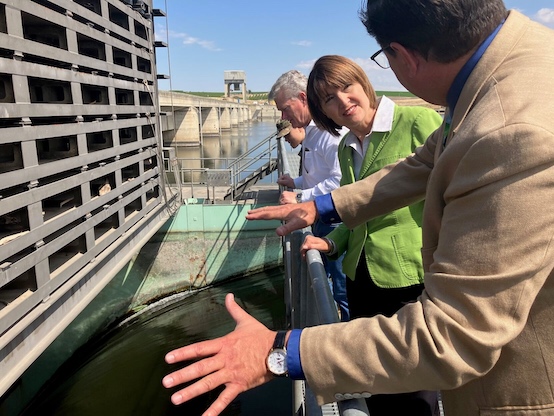forum
library
tutorial
contact

Ag groups: Snake River Dam Deal
'Leaves Farmers Behind'
by Matthew Weaver
Capital Press, December 5, 2023
|
the film forum library tutorial contact |

|
Ag groups: Snake River Dam Deal
by Matthew Weaver
|
The loss of river barging and cruising could reduce the region's local
annual tax revenues by $18 million and shrink its workforce by 15%
 The secret package of commitments the U.S. government made to the plaintiffs suing over management of the lower Snake River dams would put dam breaching advocates in "a new position of power" regarding the future of the Columbia-Snake river system, Pacific Northwest agriculture stakeholders say.
The secret package of commitments the U.S. government made to the plaintiffs suing over management of the lower Snake River dams would put dam breaching advocates in "a new position of power" regarding the future of the Columbia-Snake river system, Pacific Northwest agriculture stakeholders say.
The government and plaintiffs are expected to present their proposed package in court Dec. 15. Several members of Congress leaked the package, which was negotiated in secret and excluded agricultural and transportation interests.
"Notably, users of the system, including PNW agriculture interests, have been left out of every meaningful discussion," the groups said in a joint press release. "Instead, the U.S. government has chosen to negotiate a settlement in secret and leave farmers behind."
The groups include the Washington Association of Wheat Growers, Washington Farm Bureau, Pacific Northwest Waterways Association and the McGregor Co.
The word "navigation" is not mentioned in the draft and "irrigation" is mentioned only once, the groups say.
"As a result of the secrecy of this process, agriculture voices were largely excluded from discussion of impacts and any commitments for funding and mitigation," said Michelle Hennings, executive director of WAWG.
Ultimately, any decision on the dams' fate will be up to Congress.
"We remain committed to working with our allies in Congress to ensure the integrity of the Lower Snake River dams and salmon health are not mutually exclusive, and any decisions made are based on sound science and reliable data," Hennings said.
Neil Maunu, executive director of the Pacific Northwest Waterways Association, said his organization is "deeply troubled" by the commitments, which were made in secret.
"Throughout this two-year mediation process, we have effectively been shut out and had our navigation and transportation concerns largely ignored," he said.
The proposed package framework rests on the "shaky grounds" of a National Oceanic and Atmospheric Administration report, "which is both fundamentally unsound and politically motivated," and disregards the "extensive scientific work" of a 2020 Columbia River Systems Operations final environmental impact statement, Maunu said.
"The draft document neglects the vital issue of river navigation -- a critical service offered by our current infrastructure -- allocating a mere $750,000 for impact studies," he said. "This sum is incredibly insufficient when faced with potential impacts that might reach upwards of $30 billion per some estimates."
The loss of river barging and cruising could reduce the region's local annual tax revenues by $18 million and shrink its workforce by 15%, Maunu said.
"The prospect of removing or altering these dams poses a grave risk to the foundation of our region's economic health and threatens the most underserved and underrepresented in our community," he said. "In solidarity with our partners in agriculture, we call for actions that preserve and protect the essential systems that support our livelihoods."
Food production is among the other issues that were not addressed, said Matt Harris, director of governmental affairs of the Washington State Potato Commission.
"We have not been party to the conversation and are concerned with lack of attention to food security," he said. "The loss of ag lands should have the region very concerned."
Rosella Mosby, president of the Washington State Farm Bureau, called the leaked agreements "concerning, and said the potential impacts are "vague and one-sided."
"It's unfortunate that more voices were not considered as the impacts on food production and energy will likely be significant and far reaching," Mosby said. "We urge Congress and President Biden to work with all stakeholders and exercise a more collaborative approach to reaching a comprehensive solution that would protect salmon, ensure food security, and provide reliable energy in the western United States."
"Sound science and meaningful dialogue must be the cornerstones to real progress, not lawsuits, secret negotiations, and ignoring concerns of those who would be harmed, said Alex McGregor, chairman of the McGregor Co. "The benefits of the dams are substantial and shutting us out from consultations won't make them disappear."
McGregor added that the U.S. government's commitments speak of collaboration.
"In secrecy, even from those a party to the process? And without a clue to communities, businesses, and the people of the Inland Northwest? Empty words, alas," McGregor said. "Let's go back to sound science and meaningful dialogue, as we asked for so many years ago. Working together we can do better than this. We must and we shall."
Related Sites:
Joint Motion to Extend Stay US District Court, 8/31/23
Idaho Dept. of Fish & Game v. NAT. MARINE FISHERIES US District Court Oregon, 3/28/94
learn more on topics covered in the film
see the video
read the script
learn the songs
discussion forum
